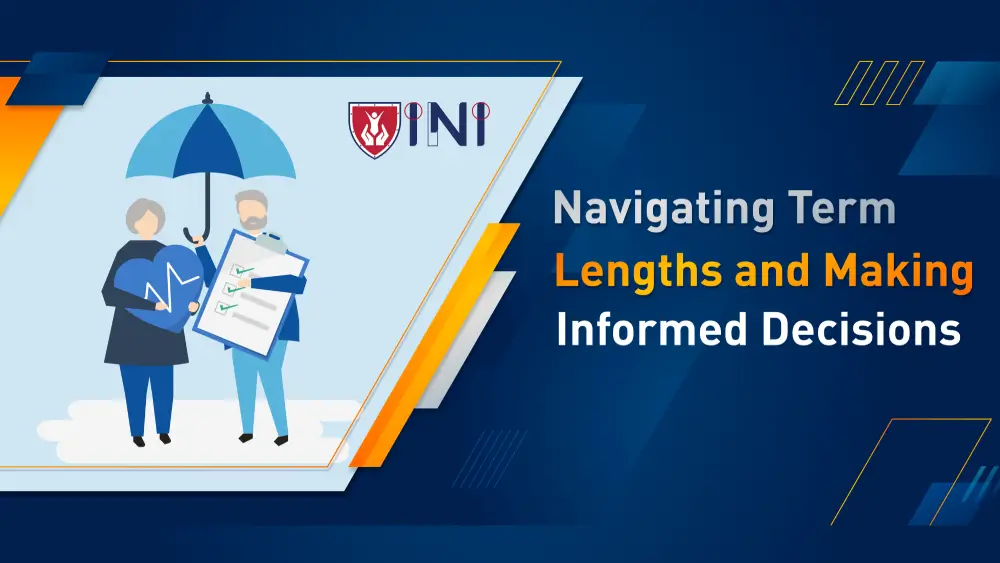How to Evaluate Term Life Insurance Quotes and Benefits
When it comes to securing your family's financial future, nothing compares to the peace of mind offered by a life insurance policy. Among the various types of life insurance, term life insurance is a popular choice due to its affordability and flexibility. However, choosing the right term length for your policy can be a critical decision.
In this blog post, we'll walk you through the essential factors to consider when selecting a term length for your life insurance policy, ensuring you make an informed decision that meets your unique needs.
What is Term Life Insurance
Before exploring the term lengths, let's briefly understand what term life insurance is and why it's a preferred choice for many. Term life insurance provides coverage for a specific duration, such as 10, 20, or 30 years. Unlike whole life insurance, it does not build cash value but offers a death benefit to beneficiaries if the insured passes away during the policy term. Term life insurance quotes are usually more affordable than permanent life insurance policies, making them an attractive option for those seeking affordable coverage for a certain period.
Recent survey data indicates a record-high intent to purchase life insurance, with 36% of consumers planning to do so within the next year. However, a staggering 102 million uninsured and underinsured Americans, constituting 40% of the adult population, feel the need to acquire or increase coverage but have not taken action.
The primary reasons cited for not buying are cost and competing financial priorities. Additionally, 53% are uncertain about the appropriate product and coverage amount, 47% have delayed the decision, and 36% believe they wouldn't qualify for coverage. Education and addressing misconceptions may play a vital role in bridging this insurance gap.
Assessing Your Needs and Financial Goals
Choosing the right term length begins with a careful assessment of your individual needs and financial goals. Consider the following factors -
-
Dependents and Financial Obligations: Evaluate the number of dependents you have and their age. If you have young children, you might want a longer term to ensure they are financially protected until they become independent.
-
Debt Repayment: Factor in any outstanding debts like mortgages, student loans, or credit card debts. Opt for a term that covers the duration required to pay off these obligations, relieving your loved ones from the burden.
-
Income Replacement: Consider the number of years your family would need financial support in your absence. A term that aligns with your working years can be ideal for income replacement.
-
Future Financial Milestones: Take into account significant financial events like college education expenses for your children or retirement savings for your spouse.
Evaluating Term Length Options
Now that you have a clear understanding of your needs, let's explore the most common term lengths and their benefits -
-
10-Year Term: A 10-year term is suitable for individuals who need short-term coverage. It's often chosen by young, single individuals or those close to retirement with reduced financial obligations.
-
20-Year Term: The 20-year term is among the most popular options. It provides coverage during crucial life stages, such as raising a family and paying off mortgages. It strikes a balance between affordability and extended protection.
-
30-Year Term: Families with young children or individuals with long-term financial commitments may opt for a 30-year term. This length ensures financial security throughout significant milestones.
-
Custom Terms: Some insurers offer flexibility in choosing custom term lengths, allowing you to align the coverage precisely with your needs. Custom terms can be beneficial if none of the standard options fit your requirements.
Top 6 Benefits of availing a Life Insurance

While selecting the term length is vital, understanding the benefits of life insurance is equally important. Some key life insurance benefits include -
-
Financial Security: Life insurance provides a financial safety net for your loved ones in the event of your untimely death, helping to replace lost income and cover expenses.
-
Debt Repayment: It can help pay off outstanding debts, such as a mortgage, credit card balances, or personal loans, reducing the burden on your family.
-
Education Funds: Life insurance can secure funds for your children's education, ensuring they have access to quality education even if you're no longer around.
-
Estate Planning: It can be an essential tool for estate planning, providing liquidity to cover estate taxes and other expenses, ensuring a smooth transfer of assets to beneficiaries.
-
Business Continuity: For business owners, life insurance can safeguard the continuity of the business by providing funds for buyouts, debt repayment, or finding a replacement for a key employee.
-
Peace of Mind: Having life insurance gives you and your family peace of mind, knowing that they will be financially protected in challenging times.
Shopping for Quotes and Comparing Policies
You may now have a better idea of your needs and the term lengths available, it's time to shop for term life insurance quotes.
Here's how to go about it -
-
Obtain Multiple Quotes: Request quotes from different reputable insurers to compare prices and coverage options.
-
Review Policy Riders: Look for policy riders that can enhance your coverage, such as accelerated death benefit, which allows you to access a portion of the death benefit if diagnosed with a terminal illness.
-
Check Financial Strength: Ensure the insurer has a strong financial rating, indicating their ability to fulfill claims.
-
Read Customer Reviews: Read reviews and testimonials to gauge the insurer's customer service and claims handling.
To Conclude…
Choosing the right term length for your life insurance policy is a crucial decision that requires careful consideration of your needs and financial goals. By evaluating your circumstances and comparing various options, you can make an informed choice that ensures your family's financial security and peace of mind. Remember to review your policy periodically, especially if significant life events occur, to ensure your life insurance coverage remains aligned with your changing needs. Protecting your loved ones with the right term life insurance policy is a thoughtful and responsible step toward securing their future.
Get Your Term Life Insurance Quote
Did you find this article helpful? Share it!







